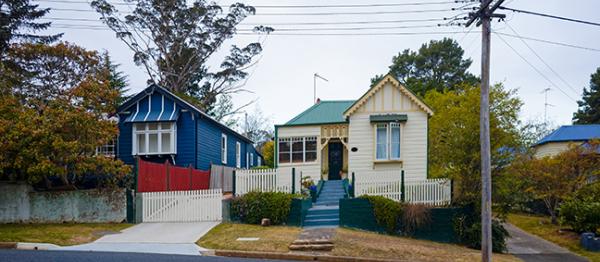17 February 2023
How to live sustainably in an apartment
Whether you’re renting or own an apartment, it can be difficult to live sustainably in a shared building. While you’re limited with lifestyle changes you can make, you do have a few options when it comes to eco-friendly apartment living. Here are our top tips when you’re ready to start living more sustainably.

THE LITTLE THINGS YOU CAN DO
Before we get into the big stuff, here’s some of the minor changes you can make to make your apartment a more eco-friendly zone.
- Lighten up - switching off your lights when they’re not in use is one of the easiest ways to conserve energy. You might even consider switching to LED lights - they’re both eco-friendly and energy-efficient, saving the environment and your bank account.
- Greener cleaner - not only do many cleaning products have harmful chemicals, they often come in single use plastic containers that you throw out after use. Try using natural cleaning products, making your own, or buy in bulk so you can refill, rather than having to throw them out and rebuy.
- Switch up your appliances - when you’re shopping for appliances like dryers and air conditioners, be sure to check their energy star ratings so you buy the most power efficient option. If you can’t buy new appliances, energy timers and monitors can help reduce your energy consumption when you’re not home to turn them off. This’ll help the environment and reduce your energy bill.
KEEPING YOUR COOL, THE ECO FRIENDLY WAY
If there is inadequate airflow in your apartment, which often occurs in high rise buildings, it may be prone to overheating in the summer months. But there’s a few things you can do to keep your cool before blasting the air conditioner.
- Lighting - not only is switching to LED lights a great way to conserve energy, they also create much less heat than incandescent or halogen bulbs, which generates 100 times more heat.
- Bedtime - if you’re having difficulty sleeping because of the heat, you might have the wrong sheets for the season. Cotton and linen are the best options for keeping cool during the warmer months, so leave your flannelette or poly-blend in winter.
- Keep the heat out - during the hottest parts of the day, make sure your blinds are closed. Then at night, open windows at both ends of the apartment if you can - this is the best way to promote airflow.
- Wait a little bit before turning on the AC - once you’ve got your apartment as cool as you can, that’s when you turn on the AC - that way, it doesn’t have to work as hard. Once it is on, try to optimise airflow by keeping doors closed to rooms that don’t need the AC.
COMPOSTING IN AN APARTMENT
The average Australian produces over half a ton - that’s 540kgs - of waste each year, and only 37% of that is recycled. Landfills deprive organic matter of enough oxygen to break down properly, meaning it releases methane into the atmosphere - and that’s not good. The best way to do your part and keep organic matter out of landfill is composting. But, this can be a bit tricky if you live in an apartment. Smaller composters mean that you can keep them indoors, and you will need somewhere to spread the compost once it’s mature. But we’ve got a few tips for that as well.
A common misconception about composting is that your compost bin will smell, and that’s not something you want in your apartment. Compost doesn’t actually smell very much at all - the reason your kitchen bin smells is because it’s organic materials mixed with non-organics, which is preventing the decomposition process.
Here are a few compost bins that would suit apartment living:
- Worm compost bin - lots of people pick this method because the worms break down the compost quickly. You can typically find red wigglers - the favoured composting worm - at your local bait shop.
- Electric composters - these turn your scraps into nutrient rich dirt in as quickly as 24 hours. Electricity helps speed up the composting process, and while it isn’t as eco-friendly as traditional composting, it’s much better for the environment than sending your food waste to landfill.
- Bokashi bin - with this one, all you need to do is put in your kitchen scraps and sprinkle some bokashi mix. This method doesn’t technically compost your waste - it ferments it. Every 6 weeks or so you’ll need to bury your scraps to complete the composting process.
Once your compost has matured, spread a little bit on your indoor plants, or mix it with potting mix if you’re planting or re-planting anything in pots. Depending on how much you produce, you can give some to friends, or find a community garden near you.
If composting in your apartment just isn’t possible, there are other ways to stop your organic matter from ending up in landfill. Community gardens will likely accept your mature compost and they often have compost bins that you can contribute to.
HOW TO START USING RENEWABLE ENERGY IN YOUR BUILDING
In an apartment you can’t just slap solar panels on the roof of your building like homeowners. However, that doesn’t mean you should miss out on using renewable energy. Luckily, there’s a few routes apartment owners can go down.
- Do your research - changing your utility company to one that supplies renewable and clean energy is the easiest and cheapest solution if you live in an apartment. You may even find that your current energy provider offers green power options, so check with them as well.
- Portable power - while portable solar panels won’t generate enough energy to power your home, they’re a cheaper option than residential panels, and you can put them on your balcony or window sills if you’ve got the room (and your landlord allows it). They’ll be able to charge your phone or laptop, power a lamp or a fan, and other little things in your apartment. It won’t make a huge impact on your energy use and bills, but they’re a great option if you can’t install larger solar panels.
- Bring the community together - community solar projects are a great option for people who can’t install solar on their roof. These groups are made possible by members pooling their money together to fund one large solar plant, meaning they can access solar energy even if they can’t afford the upfront costs or have room for their own solar panels. A great first step is to look into community solar projects in your local area, and if you can’t find one, why not start your own?
When it comes to living a more eco-friendly lifestyle, every little bit counts. Start small, and then work your way up to the bigger lifestyle changes, and before you know it, your neighbours will be asking you how they can live as sustainably as you in their apartment.
To find out more about NRMA Home Insurance, simply call us on 132 132 to get a quote or find us online 24/7 at nrma.com.au.
"This content is intended to be general in nature and is not financial or professional advice. We recommend you obtain independent professional advice relevant to your circumstances, before making any financial or commercial decisions."



